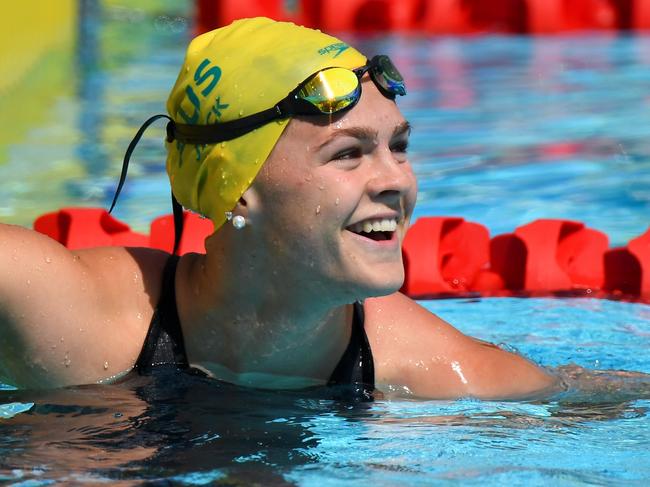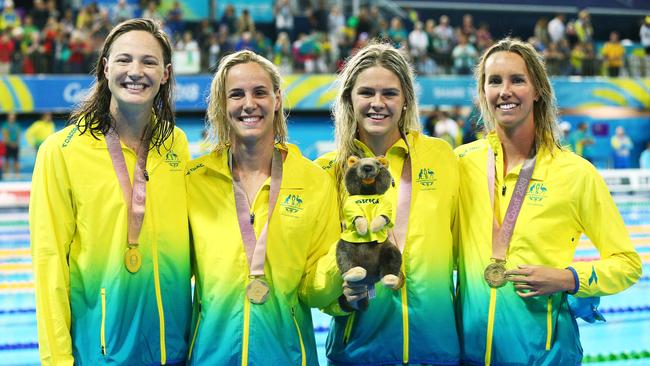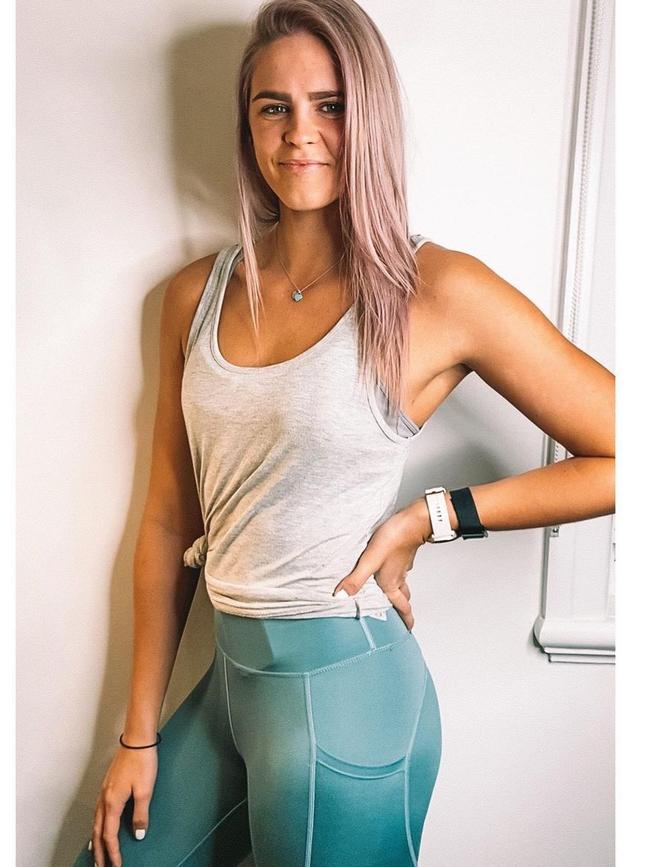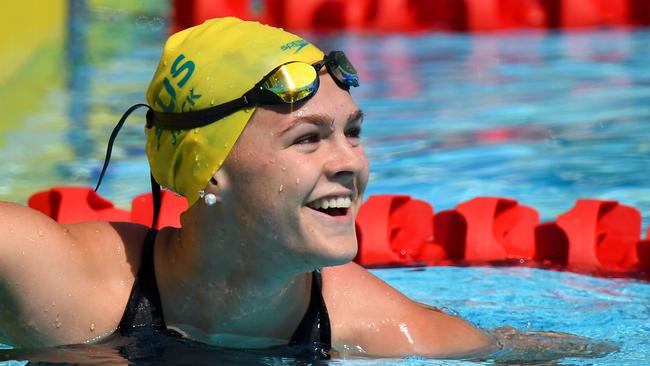Shayna Jack blames contaminated blender for failed doping test
For the first time, Australian swimmer Shayna Jack has revealed how she believes a banned substance entered her system.

Olympics
Don't miss out on the headlines from Olympics. Followed categories will be added to My News.
Australian swimmer Shayna Jack believes the banned drug she tested positive for could have come from a contaminated blender used by her boyfriend or brothers.
But the swimmer says she may never know for sure how she ingested the substance.
The Court of Arbitration for Sport last week reduced Jack’s ban for testing positive to the drug ligandrol, finding she did not knowingly ingest the substance.
The court has now published its decision in the case, revealing that she suggested three possible sources for her positive test.
Kayo is your ticket to the best sport streaming Live & On-Demand. New to Kayo? Get your 14-day free trial & start streaming instantly >

She told the court that the first possibility was that the supplements she was taking were contaminated in the manufacturing process. A second possibility was that the supplements were prepared in a blender used by her partner or brothers, which may have been contaminated with ligandrol.
The final possibility, Jack told the court, was that she came into contact with the substance while using a pool or gym open to the public in Townsville or Cairns while training for the world swimming championships in May and June last year.
However, the court said there was nothing to prove that any of these possibilities explained Jack’s positive test. “There is simply no evidence … that any of these speculative possibilities was in fact the reason for the presence of the prohibited substance in her system,” the court said in its findings.
None-the-less, the court’s sole arbitrator, Sydney QC Alan Sullivan, was impressed by Jack as a witness and applauded her refusal to blame anyone else for the fact she had tested positive.
“Even though it would have perhaps suited her case to blame others such as her partner or brothers for using supplements which contained the Prohibited Substance and which then caused an inadvertent contamination of supplements she was using, she refused to attribute such blame,” the court said. “She acknowledged that possibility, but said that it was her ‘gut’ feel that that was not the cause of the contamination.”
The court said Jack had “greatly impressed: the sole arbitrator.

“As stated, she was thoroughly but properly tested in cross-examination. But, in the sole arbitrator’s opinion, her credibility remained completely intact,” the court said. “Indeed, she was one of the most impressive witness the sole arbitrator has seen in his more than 40 years of practice.
“She appeared to be completely straightforward, genuine and honest in the answers she gave. Her demeanour was excellent and her dismay and upset at the situation she found herself was evident. She became emotional at times in giving her evidence but not inappropriately or theatrically so.
“The sole arbitrator could not detect any signs of acting or disingenuousness. On the contrary, as stated, the applicant presented as an honest, decent, reliable and very plausible witness.”
Olympic gold medallist Cate Campbell told the court that Jack was not the sort of person who would use a performance enhancing drug.
“In my years of knowing Shayna I have never witnessed any behaviour that would suggest she would knowingly take a prohibited substance,” Campbell said.
“She has handled the highs and lows that sport offers with class and dignity and has always conducted herself with the utmost integrity.”
Campbell’s sister Bronte added: “In my role at the ASA (Australian Swimmers’ Association) I have been able to witness how Shayna shares this passion with the next generation of swimmers. Always generous with her time, she has participated in swim clinics and multiple meet and greets as a way of giving back to the sport.
“I know her to value integrity and have found her to be a person of her word … In all I have witnessed Shayna has always conducted herself with pride, honesty and fairness.”
The court said that overall, the sole arbitrator was persuaded, on the balance of probabilities, that the applicant did not intentionally ingest ligandrol.
Jack’s appeal was therefore partly upheld and her ban reduced to two years, dating from July 12 2019. She will be free to resume her swimming career in July next year, but not in time for the Tokyo Olympics unless the proposal from Travis Tygart (below) is successful.

PROPOSAL THAT COULD KEEP JACK’S OLYMPICS DREAM ALIVE
Jack is a chance of being a shock inclusion in the Australian team at next year’s Tokyo Olympics.
If approved in time, a proposal to end the practice of banning athletes who accidentally test positive to low levels of banned substances would open the door to Jack.
Led by Tygart, the famed US anti-doping chief who brought down Lance Armstrong, the groundbreaking proposal is being evaluated by a special working group appointed by the World Anti-Doping Agency (WADA).
Frustrated by the increasing number of athletes who have been caught out by improved testing methods that can detect tiny traces of contaminated substances that have no performance-enhancing benefits, Tygart is pushing for the rules to be changed so that drug catchers can focus on nabbing intentional cheats.
“I haven’t seen the full decision on Shayna Jack’s case so I can’t comment on that but to treat any case in the weeds that’s at low, low levels isn’t the same as Russian state sponsored intentional (doping),” he told The Saturday Telegraph.


“But let’s be clear, we’re not talking about going light on intentional cheaters.
“This is about making sure we don’t railroad innocent athletes because any system that is willing to do that more frequently than catching intentional cheats is a system that can’t sustain itself.”
If the proposed reforms are approved in time, that could have massive implications for Jack, who is serving a two-year ban for testing positive to ligandrol even though the Court of Arbitration for Sport believed she had ingested the banned anabolic agent unintentionally.
Her suspension ends on July 12, 2021 — 11 days before the Opening Ceremony of the Tokyo Olympics — but exactly one month after the start of the Australian trials to choose the squad.

The Telegraph understands Jack will be given permission to resume training alongside her Dolphins teammates and her coach Dean Boxall two months before her ban is lifted so only needs a further 31-day reduction to her ban to compete at the trials.
There is no guarantee she will get that but her case is a classic example of why WADA is seriously looking at introducing limits for substances that are known contaminants and adopting a different approach to dealing with cases that fall below the threshold.
The full findings of Jack’s case will be publicly released next week but sources have confirmed her concentration levels were defined as “pharmaceutically irrelevant”, which is anti-doping jargon for being too itsy-bitsy to help even the Eric the Eel swim faster, while all of her other tests came back clean.
More Coverage
Originally published as Shayna Jack blames contaminated blender for failed doping test




